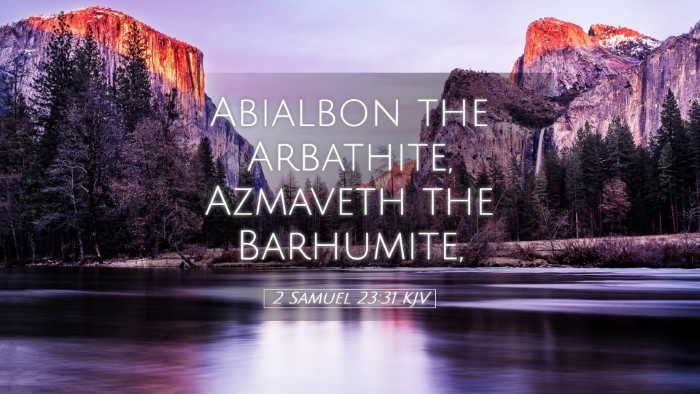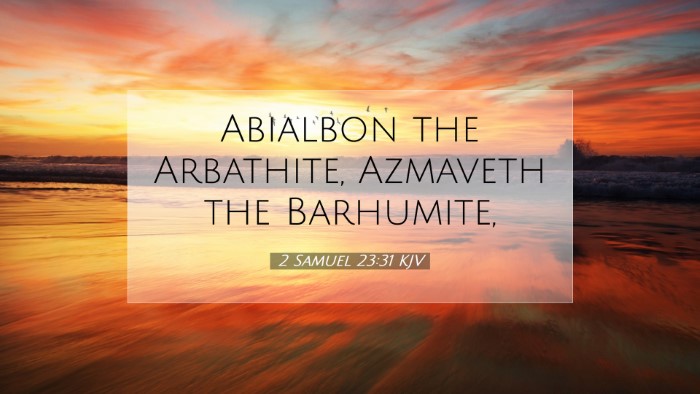Commentary on 2 Samuel 23:31
Bible Verse: "And Ahijah the Pelonite, the son of Shobach, was the commander of his army. He was one of David's warriors who stood with him in the wilderness." (2 Samuel 23:31)
Introduction
This passage is nestled in the context of the "Mighty Men" or "Valiant Warriors" of David, a significant group in the annals of Israel's history. These men exemplified loyalty, bravery, and exceptional skill in battle, serving as both military leaders and trusted companions of King David. This commentary will draw insights from notable public domain sources to explore the implications of Ahijah the Pelonite's position and the broader thematic significance of loyalty and valor in the scriptural narrative.
Overview of David's Mighty Men
David's Mighty Men are often hailed not only for their physical prowess but also for their unwavering loyalty to David during his times of trials and triumphs. The brief mention of Ahijah, while less prominent than others, serves to illustrate that even those who might not be widely recognized played vital roles in the establishment and preservation of David's kingdom.
Commentary Insights
-
Matthew Henry's Commentary:
Matthew Henry emphasizes the importance of these warriors not just as soldiers but as exemplars of fidelity and courage. He points out that while many listeners might remember the more famous figures among David's warriors like Josheb-Basshebeth or Benaiah, Ahijah's mention reminds us of the collective strength provided by a diverse group of loyal supporters. Every individual, regardless of their fame, contributes to the overarching narrative of divine providence.
-
Albert Barnes' Notes:
Barnes provides further analysis on the implications of the titles given to David's commanders. He discusses how the designation of Ahijah as a "Pelonite" suggests a possible geographical origin, which enriches the understanding of tribal alignments within Israel. This diversity among David’s warriors reinforces the theme that God's plan encompasses people from various backgrounds and regions, uniting them for a common purpose: the defense and establishment of His kingdom.
-
Adam Clarke's Commentary:
Clarke offers an in-depth look at Ahijah himself, noting the possible influence of his name ("Ahijah" meaning "My brother is Yah") which may suggest a close kinship or communal ties within the Israelite tribes. Clarke's analysis of the names and roles of these warriors highlights God's careful selection of each individual based on His divine wisdom. The unity among David's men underscores the harmonious relationship among the community of believers, echoing the New Testament's calling for unity within the body of Christ.
Thematic Reflections
The verse also reflects several critical themes relevant for pastors, students, theologians, and Bible scholars:
-
Loyalty and Commitment:
Ahijah's inclusion among David's Mighty Men underlines the importance of loyalty. As David faced numerous threats from both enemies and internal strife, the commitment of warriors like Ahijah was crucial for any leader striving for stability and peace. This can serve as a reminder for contemporary leaders about the value of surrounding themselves with trusted allies who share a commitment to a common cause.
-
The Role of Unsung Heroes:
Ahijah represents the unsung heroes in ministry and life—those who may not be in the spotlight yet play significant roles in advancing God's work. The modern church, much like David's army, requires the unwavering support and dedication of individuals in various capacities. Acknowledging these contributions encourages a wholesome view of community and service.
-
God's Providence in Diverse Leadership:
The diverse backgrounds of David’s Mighty Men remind believers that God's call extends across national and cultural lines. The inclusion of a "Pelonite" indicates the unifying power of God in forming a cohesive leadership, which can be reflected in today's multi-ethnic church bodies. Each member, regardless of background, is vital to the mission of the church, fostering a more profound sense of belonging and purpose.
Conclusion
2 Samuel 23:31 serves as a microcosm of the larger narrative of David's reign and God's faithfulness in raising leaders who exemplify bravery, unity, and loyalty. For pastors and leaders today, it highlights the necessity of cultivating mutual support and recognizing the myriad contributions of all members in the body of Christ. Through the example set by Ahijah and his fellow warriors, we are encouraged to remain steadfast in our commitments and uphold the values central to God's kingdom as we navigate our own journeys of faith.


